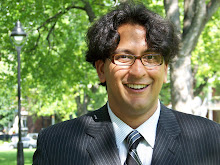I’m not quite sure how to say goodbye.
When I began writing The Daily Hab-it back on Aug. 26, 2008, I never really imagined it would become what it eventually did.
And I didn’t imagine it would be so difficult to stop writing it.
But one of the motivations I had for writing the blog to begin with was to land myself a full-time job covering hockey, and I am extremely happy and proud to announce to you all that this has happened.
I have accepted a position with NHL.com to become the managing editor of the site’s new French-language brother – LNH.com – coming to a computer screen near you very soon.
It’s an enormously exciting and somewhat daunting opportunity for me.
The lone negative is that after 781 posts over the past three years, I’m kicking The Daily Hab-it.
Starting this blog was probably the greatest decision I ever made. It gave me a chance to develop my voice, to hone my hockey analysis, to learn how to deliver my opinion to a large audience and – most importantly – it’s made me a better reporter.
But the biggest value was the relationship it allowed me to forge with you, my readers. You’ve called me out when you thought I was off base, given me a pat on the back when you thought I was right, and provided me with a window into the thoughts and anxieties of the Canadiens passionate fan base.
I’ve cherished every single one of your comments, tweets and e-mails, whether they were negative or positive, because it meant I struck some sort of chord – and that was always my goal.
There were many nights when I finished my work at the Bell Centre and didn’t really feel like sitting back down to write my blog, but knowing how many of you enjoyed reading it forced me back in my chair. It was a responsibility I took very seriously because I never wanted to let any of you down.
So thank you. Every last one of you.
There are a lot of other people I’d like to thank when it comes to this blog and its success, but in the interest of brevity (never my strong suit), there’s two in particular that stand out.
First is Jed Kahane at CTV Montreal for incorporating The Daily Hab-it into the station’s hockey coverage. Having this platform at a major media outlet allowed me to grow my reputation as a hockey reporter exponentially, and for that I’m truly grateful.
The other would be The Gazette’s Mike Boone, who was practically this blog’s unpaid publicist.
Without the exposure provided by the constant links on Hockey Inside/Out, The Daily Hab-it would have remained my tiny little pet project forever. Instead, it grew into a major voice in a crowded Montreal hockey media landscape, and that’s due in large part to Boone. So thanks, Mike.
Now, this is not really goodbye, because I’m not going anywhere.
I’ll still be covering the Canadiens regularly for NHL.com, so you’ll be able to read me there. Et pour mes lecteurs francophones, je vous invite à visiter le nouveau LNH.com une fois qu’il est en ligne dans les prochaines semaines.
But this is the last time you and I will exchange ideas in this format. Even though I couldn’t be more excited about the reason this has to be so, it makes me sad to say that this is the end for The Daily Hab-it.
It’s been a blast.
Au revoir.




